Protects Antarctic Sea Ice
 The successful establishment of SCAR and the IGY in
The successful establishment of SCAR and the IGY in Nevertheless, following the energy crisis of the 1970s, several oil companies looked to Antarctica as a possible solution to future world oil shortages by announcing plans to exploit the continent's resources. The necessary conditions for economically-sound oil production projects were beginning to ripen along with high oil prices and demand, and improved drilling technology. The prospect that Antarctica 's fragile wildnerness could be tainted as a result of oil exploration and drilling activities resulted in the mobilization of several conservation groups who were intent on preserving the continent's status as the most pristine in the world.
The effects of climate change on Antarctica vary from migrations of seal and penguin populations to other parts of the continent to abrupt changes in the glacial landscape. In March, 2000 the Larson B ice shelf in northern Antarctica - an area the size of Delaware
Despite the 1991 Madrid Protocol's 50-year moratorium placed on the exploitation of Antarctica's natural resources, future economic and population pressures could pose significant environmental threats to the continent of Antarctica . An expected and dramatic increase in world demand for energy over the next 30 years may expose the continent to countries and markets looking for alternative petroleum supplies. If Antarctica is indeed eventually opened for oil exploration activities, which many believe it will be, the potential for oil pollution occurrences such as oil tanker spills, the dumping of waste oil, natural oil seeps and well blowouts will rise substantially.
No comments:
Post a Comment